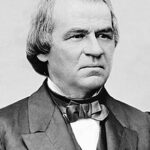President Andrew Johnson’s fierce opposition to the 14th Amendment created one of America’s most damaging constitutional crises. The amendment guaranteed citizenship and equal protection for freed slaves. Johnson viewed it as federal overreach into state sovereignty. ⚠️
The Johnson Opposition 14th Amendment Campaign
Johnson actively campaigned against ratification across Southern states. He encouraged state legislatures to reject the amendment completely. His public speeches denounced Congress as radical and unconstitutional. The president used his executive platform to undermine legislative authority.
Constitutional Conflict Emerges
Johnson’s resistance created unprecedented tension between executive and legislative branches. Congress had overwhelming Republican majorities supporting the amendment. 📊 Ten of eleven former Confederate states initially rejected ratification following Johnson’s guidance. This defiance prolonged Reconstruction uncertainty and sectional divisions.
Political Consequences Unfold
The opposition strategy backfired spectacularly against Johnson’s presidency. Republicans gained even larger congressional majorities in 1866 midterm elections. Johnson’s approval ratings plummeted to historic lows. His stance alienated moderate Republicans who previously supported his policies. 🔥
Impact:
Johnson’s opposition to the 14th Amendment produced devastating consequences for his presidency and American democracy. The decision created lasting institutional damage and prolonged racial inequality. 📉
Impeachment Crisis Triggered
Johnson’s constitutional defiance directly contributed to his 1868 impeachment proceedings. Republicans viewed his opposition as presidential overreach and abuse of power. The House voted 126-47 for impeachment articles. Johnson survived Senate removal by just one vote. His political authority never recovered from this constitutional crisis.
Reconstruction Efforts Damaged
The president’s resistance significantly delayed meaningful civil rights progress. Southern states felt empowered to resist federal civil rights enforcement. Black Codes proliferated across the former Confederacy during this period. 🔥 Violence against freed slaves increased without clear federal constitutional protections.
Long-term Democratic Harm
Johnson opposition 14th Amendment undermined democratic institutions and constitutional processes. The crisis established dangerous precedents for executive resistance to legislative authority. It weakened public faith in federal government effectiveness. 🌍 International observers questioned American democratic stability and commitment to human rights principles.
